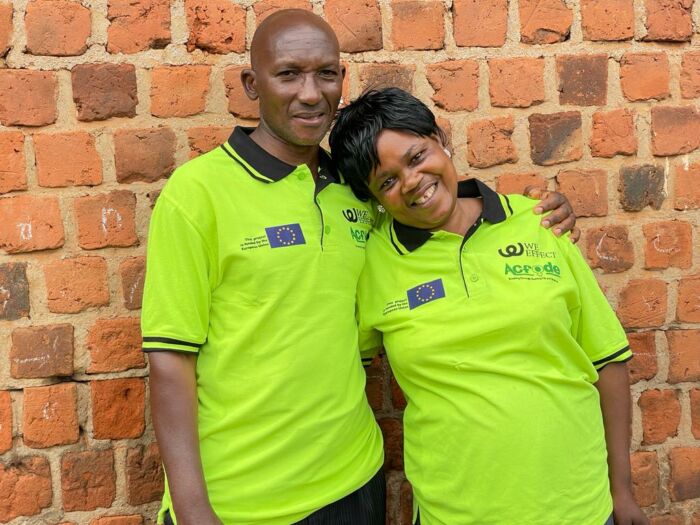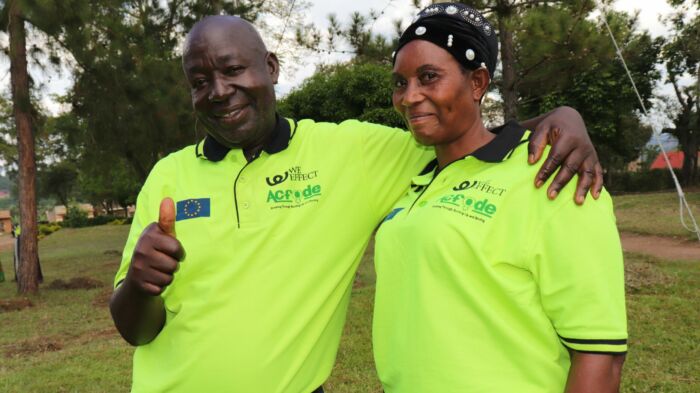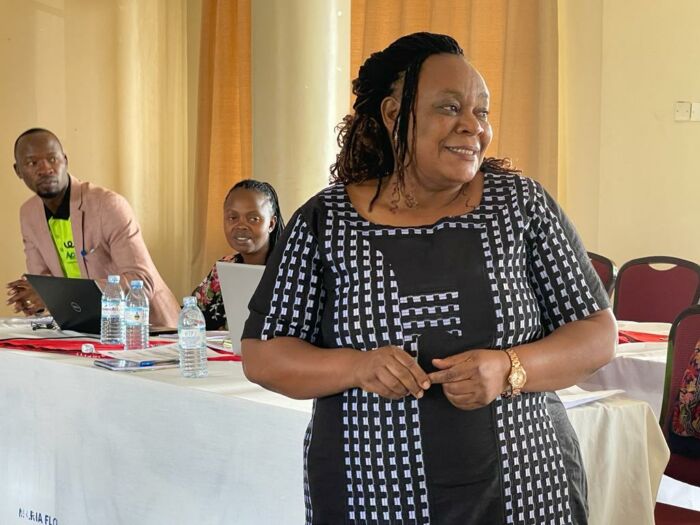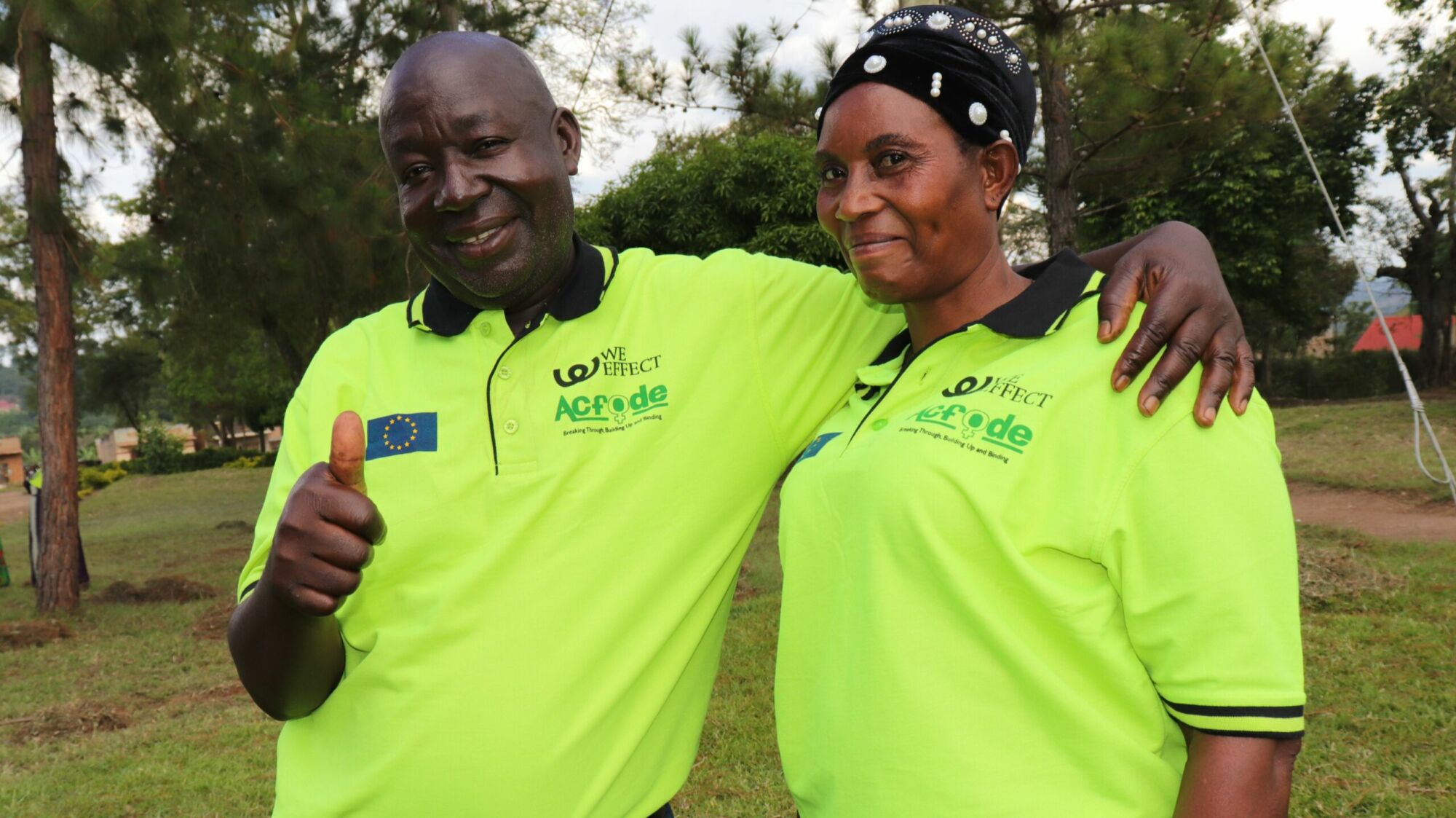
The Model Couple Approach (MCA) has been a game-changer in our community,” says Sarah, a participant in Uganda. “It has helped us address gender inequality and promote positive family dynamics to prevent domestic violence.”
Sarah is one of many couples who have benefited from the MCA, a community-based intervention implemented by Action for Development (ACFODE) in partnership with We Effect and with financial support from the European Union, to prevent violence against women and children and promote their rights in Uganda.
Through a series of workshops, group discussions, and individual counseling sessions, couples are trained on gender, social norms, and violence against women and children (VAW/C). “The aim of the training is to enhance the knowledge of couples and provide an opportunity for reflection and change in attitudes towards preventing VAW/C,” explains John, a facilitator of the MCA program.
The MCA has created a safe and supportive environment for women and children in Uganda by promoting positive communication, conflict resolution, and equal decision-making. “We have learned how to communicate better, resolve conflicts peacefully, and make decisions together as a couple,” shares David, another participant.
The MCA is implemented through a dynamic partnership with local organizations, including women’s groups and community-based organizations. “We work tirelessly to foster a community environment that advocates for gender equity and thwarts domestic violence,” says Grace, a local organizer.
Since its implementation, at least 132 couples have been trained in six districts in Uganda, and the impact has been significant. “The MCA training sessions have offered us a forum for reflection and have enabled us to open up on issues affecting our relationships,” says Sarah. “We are now equipped with strategies for preventing VAW/C and making our lives better.”
The approach is not only preventing violence against women and children but also empowering communities to exercise, protect, and promote the fundamental rights of women and children in Uganda. As Sarah puts it, “It has given us hope and has changed our lives for the better.”
Impact of the MCA:
The Model Couple Approach has been implemented in various districts of Uganda, including Bukomansimbi, Kanungu, Kisoro, Rubanda, Rukiga, and Kalungu districts, with positive results. The approach has been instrumental in addressing negative gender norms about male privilege and women’s low status and promoting gender equity. The MCA has also been able to address major causes of VAW/C, such as poverty, alcoholism, mistrust, economic imbalance, and men’s control over women’s bodies in the target districts.
A study conducted by the International Center for Research on Women (ICRW) in Nepal found that women who participated in the MCA reported a 49% reduction in physical violence and a 63% reduction in sexual violence from their partners. Additionally, the study found that women who participated in the approach reported increased decision-making power and control over household resources.
Nestled within the burgeoning neighborhoods of central Uganda, just south of the capital city Kampala, Charles Sebugwawo and his wife, Molly Sebugwawo of Bukomansimbi bear witness to the indispensable impact of ACFODE’s MCA. This approach not only champions the rights of women and children but also safeguards them against violence.

The model couple approach through the Protection of Women’s and Children’s Rights in Uganda (PWACRU) program has transformed our lives beyond measure,” proudly declares Molly, wife of Sebugwawo. “Thanks to the invaluable training, my husband and I are now able to jointly take charge of our family projects such as poultry, pigs, cows, and goats, and our love for each other has blossomed like never before.”
Although the couple faces challenges such as school fees for their children, they strive to be a model couple that inspires other couples in the community. “We have a crucial role to play in setting the pace for others,” Molly adds, reflecting on the positive changes they’ve experienced.
Thanks to training, the couple is now viewed as a beacon of peace and harmony within their community. “People come to us for guidance, and we are happy to share our experiences with them. I have no doubt that the awareness created by ACFODE and We Effect about promoting women and children’s rights will continue to impact our lives and help build a violence-free society in Bukomansimbi and Uganda at large,” narrates Molly, confidently.
In India, a study conducted by the Population Council found that the MCA led to a 57% reduction in physical violence and a 60% reduction in sexual violence among couples who participated in the program. The study also found that the approach led to improved communication and decision-making among couples, which helped to reduce conflict and prevent violence.
For example, a man from Bigasa sub-county chased away his wife and five children and remarried. Bukomansimbi police and ACFODE mediated, yielding positive results. He apologized, accepted them back, and promised support. Police and CDO witnessed.
Matovu Grace and his wife are a model couple trained in 2021 by ACFODE to fight violence in other families. They noticed gaps in their spending habits and learned more about domestic violence through ACFODE. Matovu states that they were selected for their exemplary behavior in their community, where they notify local council authorities about families struggling with excessive domestic violence. Gloria Matovu says they promote women and children’s rights in their work as pastors and through outreach to church congregations and women’s groups. They thank ACFODE for shaping them into better people.
Residential District Commissioner (RDC) of Kalungu District, Hon. Paddy Kayondo, expresses his delight at the reduction of domestic violence cases in the Kyamulibwa sub-county, Bukomansimbi District, following ACFODE’s intervention. He notes that the sub-county previously reported a minimum of at least five domestic violence cases every week, but the prevailing peace in the area is evidence of the change. Hon. Kayondo urges the Ugandan government to adopt ACFODE’s Model Couple Approach, citing its effectiveness.
Frank and Joseline Kanyandeko, a model couple from Nyamweru Sub-County in Rubanda District, faced violence in their home. However, they calmed their egos by living exemplary life and spreading awareness about preventing VAW/C through their group. ACFODE training sessions were a breakthrough for their marriage, according to Joseline. They are often approached for guidance and referred to as the best couple to learn from.
The project implements various preventive measures to combat VAW/C in addition to the MCA. For example, it provides training to representatives of Civil Society Organizations (CSOs) and paralegals, as well as primary school teachers who act as club patrons, duty bearers, and elected officials in various regions.
Additionally, the organization collaborates with partner CSOs to organize community dialogues and awareness campaigns in targeted districts. The project also facilitates the creation of linkages between survivors’ groups and government entities, participates in government events, produces information education materials (IEC), and holds meetings with women’s local councils. Through these efforts, Protection of Women’s and Children’s Rights in Uganda (PWACRU) aims to educate communities about the dangers of VAW/C and promote the rights of women and children.
Government leaders such as probation officers, Community Development Officers (CDOs), and Chief Administrative Officers (CAOs) share favorable opinions about the model couple approach, which aims to promote women and children’s rights and end violence against them. They acknowledge that this strategy has had a significant impact on targeted communities by providing role models for positive behavior and relationships.
According to Hon. Fred Kalema, the Deputy RDC of Bukomansimbi, community involvement is crucial in promoting gender equality and ending violence.
Hon. Sam Arinaitwe Kajojo, the Local Council V Chairperson of Kanungu District, recognizes the positive effects of the approach on the well-being of women and children in Kanungu. He urges ACFODE and We Effect to lobby for more partnerships to fully involve the entire district in this process, thus achieving greater coverage and making a bigger impact.

Ms. Regina Bafaki, the Executive Director of ACFODE, considers MCA to be a potent tool for promoting positive social change and building a brighter future for Uganda.
There is a growing demand from couples and other beneficiaries for ACFODE and We Effect to extend their stay, enabling the dissemination of best practices from model couples to the wider Ugandan population.
Faith Mutuku, Gender Programme Officer at We Effect, is convinced that the approach needs to be expanded to other regions in the country. The progress of the project, as well as the availability of funds to implement additional activities in line with local demands, will determine the scope of future interventions.
This is indeed an effective strategy to prevent domestic violence and promote gender equity by changing behavior, improving family dynamics, and creating a supportive community environment. It has shown a significant impact in reducing violence against women and children in ACFODE’s targeted districts of implementation.
Implementing MCA in partnership with local organizations can create sustainable change and promote women and children’s rights. More research is needed, but it is a promising approach to addressing VAW/C, particularly in Uganda. Decision-makers should recognize and support its implementation in communities in Uganda and East Africa to create a violence-free world.
We Effect and ACFODE with the support of European Union remains committed to enhancing the protection and advancement of women and children’s rights by strengthening the capabilities of Civil Society Organizations (CSOs) and duty-bearers in the fight against violence targeted at women and children across Uganda.
